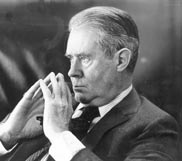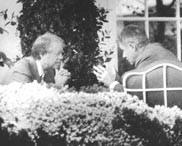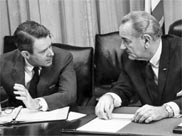Thursday January 24, 2002
Cyrus Vance Buried at Arlington
Former Secretary of State Cyrus Vance was laid to rest at Arlington National Cemetery on Thursday as a Navy band played “America the Beautiful.”
Vance’s wife, Grace, seated in a wheelchair, bowed her head during a three-volley rifle salute and the playing of Taps by a Navy bugler.
The former government official died on January 12, 2001, at age 84 after a lengthy struggle with Alzheimer’s disease. A funeral service was conducted at an Episcopal church in New York City on Saturday. It was attended by high ranking former officials from six administrations.
Vance resigned from the nation’s highest diplomatic office in April 1980 after objecting to President Jimmy Carter’s decision to mount a military operation to rescue U.S. hostages in Iran. He returned to the private sector in New York City as an attorney before retiring several years ago.
He was buried within sight of the section of the Pentagon destroyed in the September 11 terrorist attack. Some of the victims of that attack are buried near his grave site.
A Navy veteran of World War II, Vance also served as secretary of the Army in the Kennedy administration and as deputy secretary of defense in the Johnson administration. Uniformed members of the Army, Navy, Marine Corps and Air Force took part in the brief service. His body was borne to grave on a caisson pulled by six black horses.
Carter nominated Vance as secretary of State in 1977. He became known for his support of human rights and his advocacy of diplomacy in place of force.
At the State Department, Vance helped normalize relations with China, helped win approval for new treaties providing for the transfer of the Panama Canal to Panama, and helped negotiate the Camp David accords between Egypt and Israel.
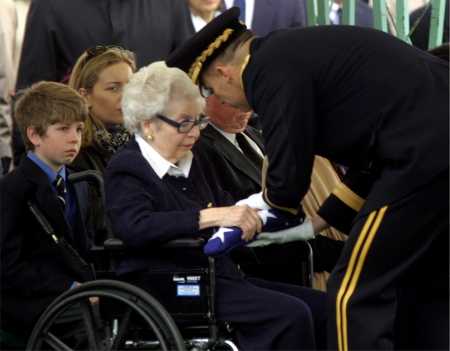
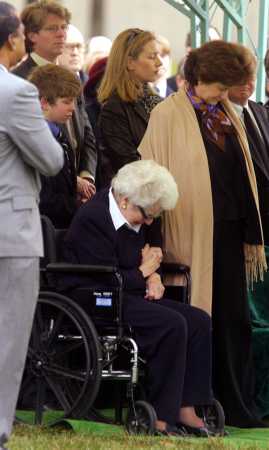
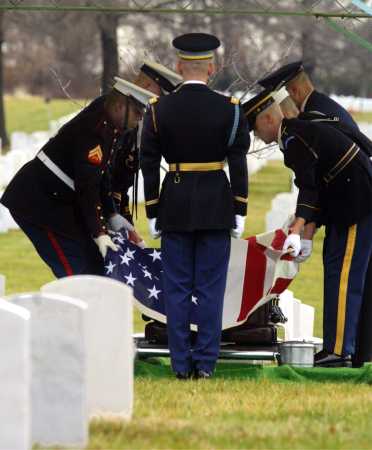
Saturday January 19 7:10 PM ET
Ex-Secretary of State Vance Mourned
Former Secretary of State Cyrus R. Vance was remembered as an old fashioned patriot, a peacemaker and a humanitarian Saturday as dignitaries representing at least six administrations mourned at his funeral.
About 1,000 people attended the service at a Manhattan church.
Vance, who served as secretary of state under President Carter, died January 12, 2002, at the age of 84 following a long battle with Alzheimer’s disease. He was to be buried later at Arlington National Cemetery.
“It will be the end of a long journey that advanced the cause of peace,” former Secretary of State Henry Kissinger said in his eulogy.
Kissinger escorted Vance’s flag-draped coffin along with former Secretary of State Warren Christopher, former Secretary of Defense Robert McNamara, former Secretary of the Army Stanley Resor, former presidential speech writer Theodore Sorenson, and Najeeb Halaby, father of Jordan’s Queen Noor.
Former Secretary of State Madeleine Albright, presidential historian Arthur M. Schlesinger, Jr., former National Security Adviser Sandy Berger and numerous ambassadors also attended the funeral at the Episcopal Church of the Heavenly Rest.
After the service, Christopher, who had been Vance’s deputy, remembered his former boss as “an old fashioned patriot.”
“He inspired a whole generation of people to try to follow in his footsteps,” Christopher said. “I think he leaves a dedication to public service and peace.”
Albright called Vance a superb secretary of state, saying “He did an incredible job in terms of trying to bring people together.”
Heading the State Department was the highlight of Vance’s career, but his duties on behalf of presidents, Congress and the United Nations spanned more than three decades. He used his peacemaking skills to ease conflicts in foreign lands, racially torn American cities and even corporate boardrooms.
“A champion for peace and human rights, he was a superb statesman,” Carter, who did not attend Saturday’s service, said in a statement after Vance’s death. “We will miss his friendship, and the world will miss his humanitarian work and goodness.”
Vance, a West Virginian who went to Yale, played a quiet but key role in guiding the United States out of the Vietnam war. Carter appointed him secretary of state in 1977, and he became known for his support of human rights and advocacy of diplomacy in place of force.
During his early tenure as secretary of state, Vance played a key role in normalizing relations with China, winning approval for new Panama Canal treaties and helping negotiate the Camp David treaty between Egypt and Israel.
But his tenure also saw the collapse of the pro-American monarchy in Iran and the seizure of American hostages there. When Carter approved a military operation for the rescue of the hostages in April 1980, Vance resigned because he felt he could not support it.
The operation ended in disaster. Eight servicemen died when a Marine Corps helicopter crashed, and the 52 hostages were held for 444 days before their release on Ronald Reagan’s inauguration day.
Later, Vance moved into the business world, resolving rival creditor claims against a debt-ridden commercial real estate firm with extensive holdings in New York City.
Vance retired several years later, when Alzheimer’s began to curtail his activities.
He is survived by his wife, Grace, five children and two grandchildren.
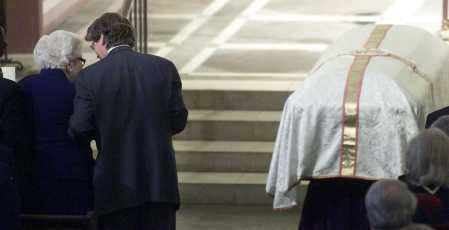
VANCE, CYRUS R.
January 15, 2002
VANCE-Cyrus R. Devoted husband of Grace Sloane Vance. Beloved father of Elsie, Amy, Grace, Camilla and Cyrus. Proud grandfather of Simon and Clare Vance and Kemal Askar. Honored father-in-law of Peggy Vance, Brigadier General (ret.) William Holmes and Atilla Askar. Died on Saturday, January 12, 2002. Funeral arrangements will be private. Contributions may be made in his memory to the UN Trust Fund in Support of Special Missions (Fund Code SZ), Yale University, the Cardiovascular Institute at Mount Sinai Hospital, New York.
VANCE-Cyrus R. The Officers, Directors and Staff of Japan Society join his many friends and admirers in mourning the passing of Cyrus R. Vance, one of America’s greatest postwar statesman and a man of the highest personal integrity. Cy lead the Society as Chairman from 1985-1993 and was its Honorary Chairman thereafter. His vision and leadership enabled the Society to expand its programs and visibility, increase its endowment and enlarge its headquarters building. He maintained a lively commitment to the U.S. Japan relationship and an active participation in the Japan Society’s activities. His wise advice and counsel will be greatly missed. We extend our deep condolences to his wife Gay and the family.
Cyrus Vance, Carter’s Secretary of State, Dies
Sunday, January 13, 2002
Former Secretary of State Cyrus R. Vance, who helped guide foreign policy through many major Cold War events of the 1970s and then resigned to protest President Jimmy Carter’s use of force in an attempt to free Americans held hostage in Iran, died yesterday at Mount Sinai Medical Center in New York. He was 84.
His son, Cyrus R. Vance Jr., said he had Alzheimer’s disease.
Vance and William Jennings Bryan were the only two secretaries of state to quit over principle. Bryan left over the nation’s entry into World War I; Vance broke with Carter in April 1980 when the president, over Vance’s vehement opposition, gave the green light for the U.S. military to try to rescue the hostages who had been held for months by Muslim militants in the U.S. Embassy compound in Tehran.
“I knew I could not honorably remain as secretary of state when I so strongly disagreed with a presidential decision that went against my judgment as to what was best for the country and hostages,” Vance later explained.
Vance did not immediately announce his resignation but gave it to Carter without waiting for the outcome of the mission, which failed when a rescue helicopter and a cargo plane collided in the Iranian desert, killing eight American servicemen.
A few days later, Vance quietly walked away from the councils of the Carter administration and his position as one of the Democratic Party’s most influential voices on foreign policy.
Vance was born in Clarksburg, West Virginia, on March 27, 1917. He attended Yale University, where he earned both a bachelor’s degree and a law degree, graduating from the law school with honors in 1942.
After World War II service as a naval gunnery officer, Vance began an association with the influential Wall Street law firm of Simpson, Thacher & Bartlett, which, except for his periods of government service, would continue throughout his life. He also became active in Democratic Party affairs.
When John F. Kennedy became president in 1961, Vance began climbing the upper ranks of the foreign policy and national security apparatus. In quick succession, he served as general counsel of the Defense Department, secretary of the Army and deputy defense secretary under President Lyndon B. Johnson.
He left government in 1967 but returned in 1968 to be Johnson’s special envoy in the crisis over North Korea’s seizure of the U.S. intelligence ship Pueblo and deputy chief American delegate to the Paris Peace Conference on Vietnam.
By the time Richard Nixon was elected president in November 1968, Vance was regarded as an establishment pillar.
Vance became secretary in an administration determined, sometimes haltingly and amid great controversy, to change the conduct and administration of U.S. policy. Under Vance, the State Department began a vigorous emphasis on human rights that traditional diplomats criticized but much of the Third World admired. He also began the first truly concerted effort to recruit women and minorities for leading department posts. The Carter-Vance team worked vigorously to engage the Soviet Union in a variety of arms-control initiatives.
In terms of specific foreign policy accomplishments, the first three years of the Carter administration were especially fruitful. It won congressional approval for turning the Panama Canal over to Panamanian sovereignty, the Camp David peace accords between Israel and Egypt were signed, and the U.S. decided to recognize Beijing as the sole, legitimate government of China.
In all of these initiatives, Vance was among the major players, although his quiet, self-effacing manner frequently obscured the size and importance of his role. In contrast to his predecessor as secretary, the flamboyant Henry A. Kissinger, Vance approached diplomatic negotiation with a low-key but persistent and no-nonsense attitude that one senior State Department official had characterized as “the quintessential Wall Street lawyer. Whatever the matter on the table, he saw it as a contract that wasn’t quite ready for signature but that could be gotten there with just a little more work.”
A man of many ascetic qualities, he had commuted in New York by subway, and on his first official trip overseas, he traveled by commercial airline. Even on Air Force transportation, Vance, usually wrapped in an old cardigan, insisted on a style of travel so minimalist that a reporter described traveling with him as “Protestant ethic tours — the idea that if you have to go to far-off exotic places, you should do it under conditions of severe austerity that ensure you won’t enjoy it.”
Vance’s tenure was troubled by rivalry with Zbigniew Brzezinski, Carter’s national security adviser, who spoke out in provocative ways, frequently without consulting Vance. Moreover, he often took hawkish and anti-Soviet positions that ran counter to Vance’s quieter efforts to seek consensus with Moscow.
Carter was forced to intervene, but the rivalry persisted, and Vance, weary of the infighting and under pressure from his wife to return to private life, confided that he intended to leave at the end of Carter’s first term.
But in late 1979, the hostage crisis broke out. Pressure to win the hostages’ release was enormous. Carter authorized the rescue mission at a meeting attended by Brzezinski but not Vance, who was vacationing in Florida. Vance rushed back and asked for a chance to argue against it.
At a following meeting, he insisted that the mission would anger American allies who had agreed to impose sanctions on Iran only after the administration had promised to give them a chance to work. Vance also argued that risks to the hostages and bystanders were too great. But his arguments failed.
Returning to his law practice, Vance served briefly as chairman of the Federal Reserve Bank of New York and was instrumental in brokering a series of temporary cease-fires between feuding factions.
“A champion for peace and human rights, he was a superb statesman who served me and other presidents well,” Carter said in a statement from himself and his wife, Rosalynn. “We will miss his friendship, and the world will miss his humanitarian work and goodness.”
Vance is survived by his wife, five children and two grandchildren.
January 13, 2002
Cyrus R. Vance, a Confidant to Presidents, Is Dead at 84
Cyrus R. Vance, who after two decades in public service was appointed secretary of state, and who then took the rare step of resigning from the nation’s highest cabinet post on a matter of principle, died Saturday afternoon at Mount Sinai Medical Center in New York. He was 84.
The cause was pneumonia and other complications, said Elva Murphy, his longtime secretary.
Mr. Vance was secretary of state from 1977 until 1980, when he resigned in protest over President Carter’s decision to try a military rescue of American hostages in Iran, an action that he considered ill advised and futile. He was soon proved right.
After more than 20 years in and out of government, during which he served several presidents, Mr. Vance submitted his resignation with what he called “a heavy heart.”
His doubts that the elaborate rescue would succeed, and his fears that it would sabotage diplomatic efforts to free the 52 American hostages, brought him to what he called “one of the most painful days of my life.”
His opposition to the rescue mission was the immediate cause of his resignation, but he had already come to see that President Carter was increasingly rejecting his advice in favor of that of his national security adviser, Zbigniew Brzezinski.
As it turned out the rescue attempt failed. Of the eight American helicopters sent on the mission, three broke down in the first stage of the operation. It was decided to abandon the mission, but there was more humiliation ahead for the United States. One of the remaining helicopters collided on the ground with a transport plane and both craft burned. Eight servicemen died in the fire and the rest fled.
The failed mission became an issue in the 1980 political campaign in which President Carter was defeated by Ronald Reagan. The hostages were not released until the day of Mr. Reagan’s inauguration, 444 days after they were taken captive.
Mr. Vance said in 1999 that he had watched from the sidelines with “frustration and sadness” as relations between the United States and Iran “plunged into increasing hostility, mistrust, name calling and mutual recrimination.” In an address at the Asia Society, Mr. Vance called for the re-establishment of diplomatic relations with Iran.
Mr. Vance – who had decided to leave office whether the rescue succeeded or failed – was only the second secretary of state in the history of the United States to resign on a matter of principle, joining what another secretary of state, Dean Acheson, called “the most exclusive club in America.” William Jennings Bryan, the only other secretary of state to resign, was a pacifist who resigned in 1915 over policies by Woodrow Wilson that he thought might lead to war.
An Obligation to Serve
That Mr. Vance allowed principle to get in the way of his career came as no surprise to the people who knew him best. To them, Cyrus Vance, the tall, lanky, patrician lawyer with the open face of a prep- school boy was Mr. Integrity, Mr. Honesty. He was the epitome of the American establishment, that small group of men who moved seamlessly from the prep schools of New England and the Ivy League colleges of the East to the law firms of Wall Street, with time out for service in government. Then they would return again to private practice, bringing with them the old values of family, work and public service.
After his return to private practice, Mr. Vance was repeatedly called back to the public arena to use his quiet negotiating skills on some of the bloodiest conflicts of the 1980’s and 1990’s: in the Nagorno-Karabakh dispute between Azerbaijan and Armenia; in South Africa; and in a disintegrating Yugoslavia. There, he successfully negotiated a cease-fire in Croatia to allow a United Nations peacekeeping force to enter and disarm warring Militias.
In accepting one assignment after another, Mr. Vance was only doing what he believed was expected of him. He said, “A lot of us were raised in families where we were taught that we were very fortunate, that we were going to have a good education, and that we had the responsibility to return to the community some of the benefits and blessings we had, and that there was an obligation to participate in government service at the local, state and national level.”
This, in a nutshell, was the unself-conscious voice of the establishment – the one that Jimmy Carter ran against so vigorously that his campaign manager, Hamilton Jordan, once said: “If, after the inauguration, you find a Cy Vance
as secretary of state and Zbigniew Brzezinski as head of national security, then I would say we failed. And I’d quit.”
Mr. Vance was Mr. Carter’s first appointee, followed soon after by Mr. Brzezinski. Mr. Jordan did not quit.
In both his personal approach to the job and his overall philosophy, Mr. Vance presented a striking contrast to his flamboyant predecessor, Henry A. Kissinger. A calm, publicity-shy diplomat who was more a mediator than a policy maker, Mr. Vance was one of the most modest and unpretentious men ever to hold the post. He was a popular figure around the State Department as he loped through the hallways in his pinstripes or tweeds, occasionally rumpled but always well tailored.
When he took office, Mr. Vance vowed to limit his travel abroad and eschew Mr. Kissinger’s shuttle diplomacy – a pledge that quickly fell by the wayside. But while he adopted some of Mr. Kissinger’s tactics, he harbored doubts about his strategy. Mr. Vance was deeply skeptical that any master plan could provide answers for individual foreign policy problems. He did not think in terms of a Soviet grand design to encircle and undo the West any more than he thought about a grand design for American foreign policy. His method was “to slog it out,” putting together solutions to individual problems.
Prof. Norman A. Graebner, a historian of American diplomacy at the University of Virginia, said, “The general attitude toward the acceptance of the Soviet position in the world and the fact that revolutionary pressures in the third world were genuine and that it was America’s task to live with those realities was most pronounced during those first Carter years.”
VANCE, CYRUS ROBERTS
- LT US NAVY
- WORLD WAR II
- DATE OF BIRTH: 03/27/1917
- DATE OF DEATH: 01/10/2002
- BURIED AT: SECTION 64 SITE 6551
- ARLINGTON NATIONAL CEMETERY
Michael Robert Patterson was born in Arlington and is the son of a former officer of the US Army. So it was no wonder that sooner or later his interests drew him to American history and especially to American military history. Many of his articles can be found on renowned portals like the New York Times, Washingtonpost or Wikipedia.
Reviewed by: Michael Howard

